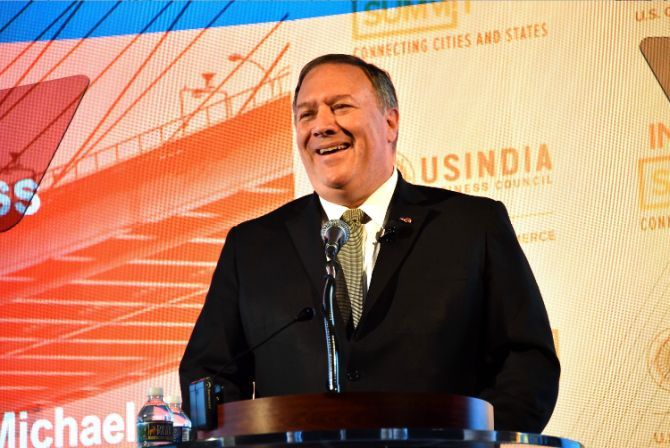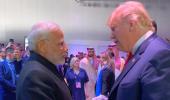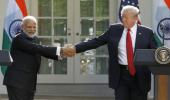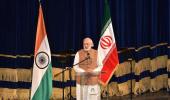Jaishankar said India will try to find common ground on trade issues during discussions with Pompeo.

Terrorism, H-1B visas, trade and the situation arising out of United States sanctions on buying oil from Iran, will be among a host of issues on the table when External Affairs Minister S Jaishankar holds talks with his American counterpart Mike Pompeo on Wednesday.
The US Secretary of State's visit starting Tuesday night is the first high-level visit from any country following the Lok Sabha polls. The two leaders will hold talks on Wednesday -- their first meeting after Jaishankar assumed office last month.
Pompeo's visit comes ahead of a meeting between US President Donald Trump and Prime Minister Narendra Modi on the sidelines of the G20 Summit, which will be held in Osaka, Japan from June 28-29.
During his visit, Pompeo will also have a working lunch with Jaishankar and call on Prime Minister Narendra Modi.
He will meet Indian and US businesses in a round table format and deliver a policy speech at the India International Centre.
Jaishankar, while speaking about the visit in Gandhinagar, said India will try to find common ground on trade issues during discussions with Pompeo.
"We will be meeting with a positive attitude," he told reporters after filing his nomination papers for the Rajya Sabha poll from Gujarat.
"The meeting with Mike Pompeo will be an important one. We will definitely discuss issues related to trade between the two countries," he said.
"Both the countries are having their own interests. And it is natural to have some conflicts because of that. We will find a common ground using diplomacy. We will hold discussions with the US with a positive approach," he said.
Diplomatic sources said there is no 'structured agenda' for the talks between Pompeo and Jaishankar, and the entire spectrum of the relationship will be on the table.
They said the talks would be 'substantive' but should be seen as a 'getting to know each other' meeting, rather than one with concrete deliverables and agreements.
Diplomatic sources said combating terrorism, including cross border terrorism, is an 'inescapable' topic of discussion in Indo-US talks and will be 'very high' on the minds of the two ministers.
Another matter that is likely to figure high in the talks is the H-1B issue with an American official saying Pompeo will assure the Indian leadership during his visit to India that the Trump administration has no plans to impose a cap on issuing the highly sought-after H-1B visas that are forcing foreign companies to store data locally.
The H-1B visa, popular among Indian IT professionals, is a non-immigrant visa that allows US companies to employ foreign workers in speciality occupations that require theoretical or technical expertise.
On the issue of the situation arising out of the ending of exemptions from US sanctions to buy oil from Iran, the diplomatic sources in New Delhi said a decision will be taken based on India's energy security and commercial considerations.
The engagement with the US will continue on how it can help India get alternative supplies.
On tensions running high in the region after after Iran shot down a US spy drone last week and Trump considered, then cancelled, a retaliatory strike, a diplomatic source said: "It is a matter of great concern. We will talk to Secretary Pompeo and Iranians and ask both sides to de-escalate."
The source, however, made it clear there was no request made to India from either side to mediate and it would take up the issue due to its concern over the safety of its diaspora and regional peace.
With trade likely to figure in the talks, sources said there has been substantial progress on this front with trade going up by double digits in the last three years and trade deficit going down by double digits under Trump presidency.
The source said the issue of high tariffs was 'misunderstood' as every country puts tariffs on different items and India's tariff policy was in line with other developing countries.
Asked about the industrial security agreement that will allow the transfer of defence technology, the diplomatic source said the Indian side has got the text from the US side subsequent to the last 2+2 meeting.
"Our systems are broadly in alignment for us to conclude this industrial security agreement. We need to ensure that the processes involved in securing the information at the industrial level followed by the two countries are broadly compatible so that there is no leakage of information," the source said.
The negotiations for the agreement are at an advance stage, the source added.
On US opposition to India acquiring S-400 missile system from Russia, the source said it was a matter of concern to the US, but the circumstances under which India signed the agreement was known to America.
The Indian side feels that its case falls meets the requirement to fall under the provisions for waiver in the Countering America's Adversaries Through Sanctions Act.
"We meet the CAATSA conditions for waivers from our point of view. We continue to remain engaged," the source said.
The Indian side also remains engaged with the American side on Afghanistan, sources said.
On the US concerns over data localisation, the sources said India is cognizant of their concerns, but the policy is under consideration. The concerns expressed by foreign governments and companies will be taken into consideration, the sources said.
The sources said India is deeply committed to regional development and had even spent $ 25 billion on connectivity projects.











 © 2025
© 2025